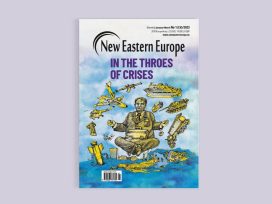
Voters have always overlooked breaches of democratic principle as long as they are getting what they want. This mattered less when politicians held each other in check. But with the tribalisation of public debate, democratic gatekeeping breaks down.
European stability is threatened less from outside than from within, argues Samuel Abrahám. Does the EU possess a strategy for dealing with the type of illiberal politician gaining ground in the Visegrád Four nations?
Today, Europe seems as stable as ever. Indeed, a bulging and prosperous European Union combines happily with secure and democratic former communist countries; liberal democracy is the norm, anything else an aberration. EU expansion – in combination with Nato – has provided strategic guaranties and healthy psychological unity, seemingly leaving no place for the dark forces of the past. This newly emerged political, economic and bureaucratic unit is without historical precedence, even if we go back as far as the Roman Empire.
Yet there are signs that stability and security in Europe cannot be taken for granted. The peace and prosperity that Europe has enjoyed for decades is not a given but a condition to be strived for in every period – whether stable or tumultuous. Today’s Europe is no different: there are plenty of causes troublemakers can exploit to win popular support. Paradoxically, a future threat to European stability is less likely to come from outside or from the economic crisis, and surely not from the arduous but healthy search for a common European identity.
Rather, the threat could arise from the fact that Europe – built and expanded on the ticket of economic cooperation and solidarity as well as political consensus – has no strategy to inhibit a member-state that becomes hostile to its political status quo. This is a potential, though not an inevitable threat to Europe’s stability. One would expect a debate to take place about the measures necessary in such an emergency, and that the results of this debate be implemented. Gravely, this has not taken place, and nor will it – a fact that is explainable but illogical.
Recent developments indicate that the greatest potential for radicalization emerges from the countries that entered the EU during the last waves of expansion. The group of states that could nurture radical political groups or movements does not exclude the Visegrad Four. Indeed, these very countries have recently brought forth politicians and ideologies that might be heading in a direction that could endanger the EU.
In some of the new member states, including the V4 countries, there are tendencies towards a preference for strong, dominant leaders who often defy liberal-democratic rules and always use nationalism, demagoguery and xenophobia as a mean to sustain high support. The spectre of this new type of leader haunts the V4 countries: instead of being in the service of the rule of law, respecting the principles of political opposition and an independent judiciary and media, these new leaders are becoming impatient with the central tenets of liberal democracy. Their main political tools are the use, at will, of populist, nationalist rhetoric; the total control of their parties; and mafia-style power brokering. They do not shy from entering into coalitions with extremist parties and leaders – often presenting themselves as moderates and guarantors of stability and democracy. What is more, they enjoy a high degree of popularity.
Are they dangerous to their society and perhaps to the stability of Europe? Not as dangerous as the authoritarian leaders of the 1920s and 1930s – at least not yet. So far, the enemies that are blamed for the ills of society have been internal or among immediate neighbours. The danger will arise once blame is sought in the structure of the EU itself. For now, the EU provides enough guarantees to discourage these leaders to become dangerous. At the national level, the infrastructure of the EU offers transfer funds, free trade and social prosperity. Personally, the EU is a source of legitimacy for these politicians, who enjoy the perks connected with their status and would certainly not pass up the opportunity of socializing with other European leaders on various state and festive occasions. Being seen in the company of foreign luminaries always enhances respect at home.
It is not clear whether any leader – whether incumbent or in opposition – within the V4 or elsewhere could endanger the stability or even the existence of the EU. We cannot predict whether a leader within Europe will turn into a demagogue with a strong ideological agenda that would eventually paralyse the Union itself. However the signs of danger need to be analysed; we have to distinguish what is a real threat to the EU and what is only temporary or rhetorical. The Kaczynski brothers in Poland, Robert Fico in Slovakia, Viktor Orbán in Hungary or Jirí Paroubek and Vaclav Klaus in the Czech Republic are politicians that are very different personally and politically, but might under certain circumstances threaten the stability of the EU. Not because they wish directly to undermine the EU, but because their policies might unleash processes that the EU would not be able to halt. Certainly, none represents a threat to the EU today, despite their populist, sometimes nationalist, and sometimes demagogic policies and rhetoric. However their successors, or they themselves under certain circumstances, might become dangerous. If so, the EU would have no defence.
What is frightening and disconcerting is that if such a leader emerges, the EU has no procedures, no contingency plan or power to isolate and restrain them. It seems that the EU is conditioned and suited, at best, for moderate political or economic crisis. There is no legal or political strategy for countering a major crisis that could undermine the EU’s own existence. The reason for this lack of self-protective instinct is that the EU is a voluntary union and not a state, or even a federation, and hence has no legitimate means to repulse a threat to itself. For now and the foreseeable future, the EU is based on collective solidarity, peaceful coexistence, good intentions and great deal of trust. Noble and cherished attributes, indeed; but also vulnerable and detested by many.
Until now, the EU has been guarantor of stability: it is a legal and political safety net, a source of restraint over overt extremism in any member country. Open borders connect citizens, especially the younger generations; open markets and financial redistribution provide economic stability and cohesion among nations. However, the gaping economic disparity between member states as well as competition for limited resources and investment cause a strain that could threaten this stability. Economic prosperity can no longer “integrate” Europe.
After the wave of eastern expansions, the stress is more on culture, history, religion and solidarity – even individual solidarity as a precondition of any meaningful source of unity and common legitimacy. However, these useful and perhaps necessary values are too intangible and abstract to be able to guarantee the same degree of cohesion as economic prosperity and institutional solidarity.
What would be the necessary internal preconditions for the emergence within a member country of a demagogue that could undermine the status quo of EU? First, a strong extremist ideological agenda, as has commonly occurred in various member countries. Second, a leader would need to secure a constitutional majority within society. The constitution of each member country would have to be radically altered in order to give a free hand to an extremist leader. Third, a permanent frustration must be present that could continually be mobilized. This is a very difficult goal to achieve for any extremist in a prosperous and democratic EU country. Finally, there would have to be a continuous economic crisis. Until recently, this looked unlikely, though not since the crisis of global economy that began at the end of 2008. It must be said, however, that only a combination of these factors could pose an overt threat to the security of the EU.
There are also several issues, or rather antipathies, which might mobilize large segments of a population to support radical leaders. Turkish entry into the EU has been and could be used and misused by many radicals in Europe. The dispersed and often despised Roma population, especially in central and eastern Europe, could become a convenient object with which to harness large support for a radical demagogue. Finally, and this is a European-wide issue, the status of immigrants – especially from Africa and Muslim countries – has the potential to heighten the crisis in Europe. One could list more factors, tensions and issues, all of which represent a vehicle for radicalization.
Hopefully, the EU will not experience a combination of these factors or a deterioration of these issues. Hence, at least theoretically, there is no immediate threat to the EU. The problem is that we are unlikely to witness a serious debate any time soon, either in the EU Parliament or among the EU leaders, on protecting the EU against the potential threat posed by a demagogic leader to its own stability and security.
Such a debate, not to mention the implementation of its results in legal and constitutional form, would be a prudent act of anticipation of all possible developments in the EU. However, European politicians are preoccupied with day-to-day affairs, economics, national issues and their re-election. The stability – or mild crisis – in which Europe finds itself today gives no grounds and allows no time for a potentially explosive debate on power-limiting measures.
However, even if such debate were to take place in the EU parliament, or at the Commission or during a summit, the necessary precautions would be widely refused by numerous member countries. Measures to contain any member state that threatened another state or the EU itself – measures that in times of crises would limit, in major way, the political sovereignty of a single state – would require broad consensus. In the current period of peace and stability, such laws would be impossible to pass in the EU parliament and even harder to implement in most European countries. Paradoxically, passing such laws would be more feasible if the EU were to face a concrete stability crisis, in response to an emergency situation in a member country. However, by then all the steps and counter-measures might be erratic, insufficient or simply too late. The case of failed containment of Austrian leader Jörg Haider was a clear example of incompetence and lack of coordination. The EU failed to face down a rather insignificant figure in a small EU country: after all, Haider was only a minor partner in the government of pro-EU prime minister.
My aim is not to forecast ominous threats about to engulf the EU. It is to show a principal vulnerability of the EU to a combination of factors – for now fortunately unlikely. Even if the crisis did not take place in the immediate future, a debate about this vulnerability and measures to counter it would strengthen the EU’s stability and legitimacy. It would also discourage potential demagogues from trying to bolster their positions of power at the expense of EU security.
Taken from a special English language edition of Res Publica Nowa, published with the support of the International Visegrad Fund.

Published 23 October 2009
Original in English
First published by Res Publica Nowa V4
Contributed by Res Publica Nowa © Samuel Abrahám / Res Publica Nowa / Eurozine
PDF/PRINTSubscribe to know what’s worth thinking about.

Voters have always overlooked breaches of democratic principle as long as they are getting what they want. This mattered less when politicians held each other in check. But with the tribalisation of public debate, democratic gatekeeping breaks down.

What the war in Ukraine has taught us about solidarity; why European democrats must insist on fair play; and Moldovan democracy under hybrid attack.